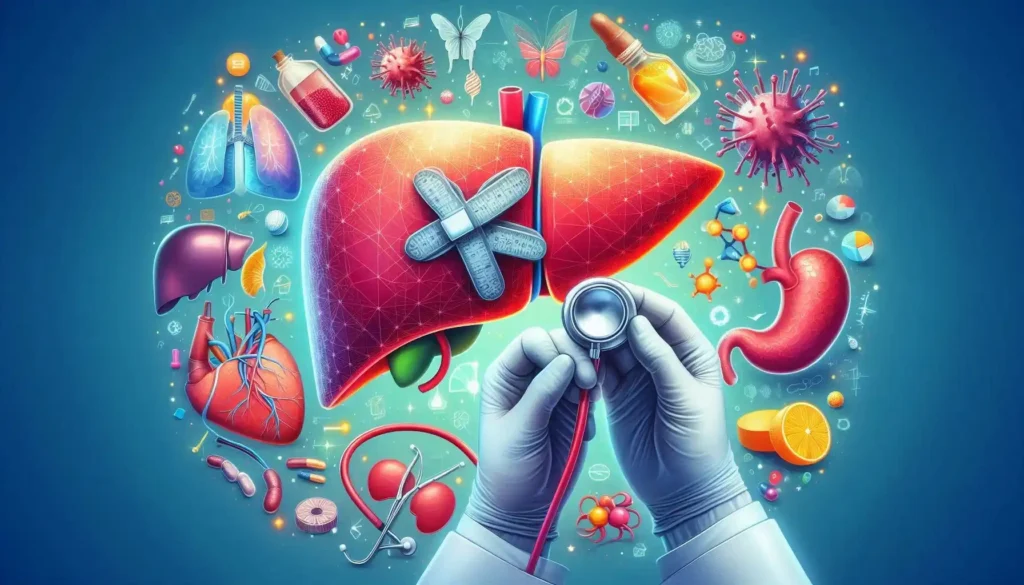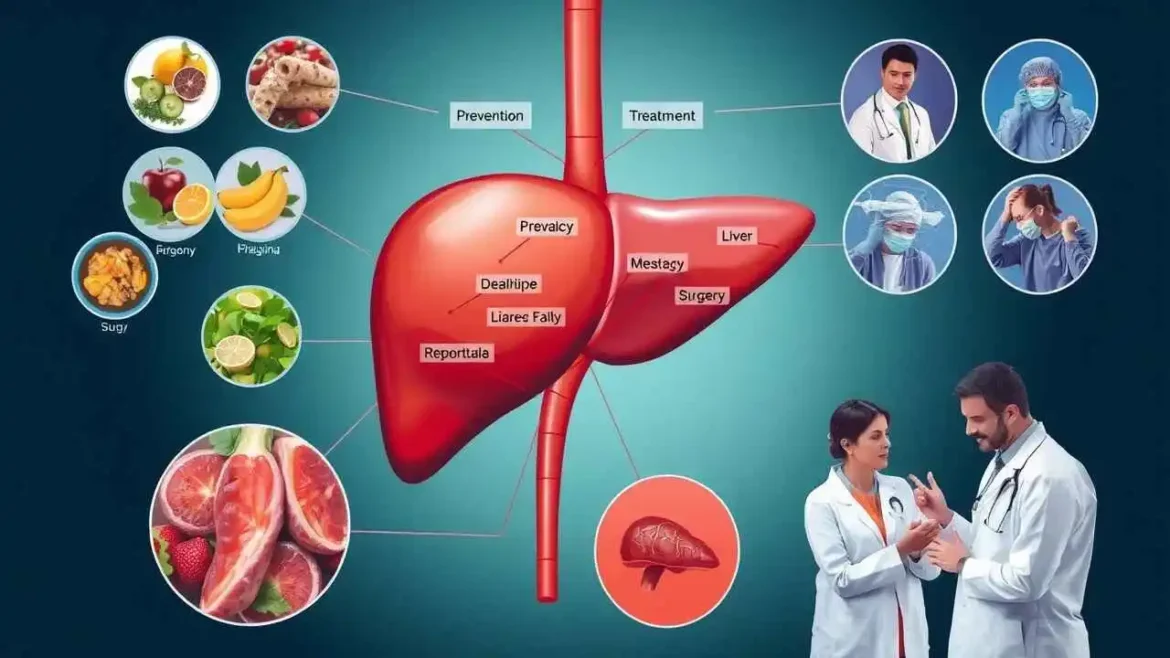
Our Body’s Silent Workhorse: Understanding and Protecting Your Liver Health.
We often take many of our internal organs for granted, functioning quietly behind the scenes, performing essential tasks without demanding our attention. Among these tireless workers, the liver stands out as arguably the most vital and complex. Tucked away in the upper right-hand portion of our abdominal cavity, beneath the diaphragm and above our stomach, right kidney, and intestines, the liver is the body’s primary metabolic hub, performing hundreds of critical functions that keep us alive and healthy. While resilient, our liver is not indestructible, and understanding its needs is crucial for safeguarding our overall well-being.
As we navigate our modern lives, increasingly exposed to processed foods, environmental toxins, and various stressors, the burden on our liver can grow. Liver diseases are on the rise globally, making awareness and proactive care more important than ever. In this article, we will explore the incredible roles our liver plays, the common threats it faces, and practical steps we can take to support this vital organ.
The Multifaceted Role Our Liver Plays
Our liver is a chemical factory, a detoxifier, a storage unit, and a processing plant, all rolled into one. It’s an incredibly versatile organ, essential for nearly every metabolic process in our body. Let’s look at just some of the key functions we rely on our liver for:
- Detoxification: This is perhaps the most well-known function. Our liver filters blood coming from the entire digestive system, removing toxins, waste products, and harmful substances (like alcohol, drugs, and pollutants) before allowing the blood to circulate throughout the rest of the body. It converts these harmful substances into less toxic forms that can be excreted.
- Bile Production: The liver produces bile, a fluid essential for digesting fats in the small intestine. Bile also helps us absorb fat-soluble vitamins (A, D, E, and K) and helps the body eliminate waste products like bilirubin (a byproduct of red blood cell breakdown) and excess cholesterol.
- Synthesis: Our liver synthesizes many crucial proteins, including albumin (which helps maintain fluid balance in the blood) and blood clotting factors (essential for stopping bleeding).
- Metabolism: It processes carbohydrates, fats, and proteins from our diet, converting them into energy or storing them for later use. For example, it converts glucose into glycogen for storage and converts stored glycogen back into glucose when our body needs energy.
- Storage: The liver stores important vitamins (A, D, E, K, B12), minerals (like iron and copper), and glycogen (a form of sugar).
- Hormone and Drug Metabolism: It breaks down and metabolizes various hormones and medications, ensuring they are properly processed and eliminated from the body.
- Immune Function: The liver removes bacteria from the bloodstream and produces immune factors that help resist infections.
- Energy Storage and Release: The liver stores glucose as glycogen and releases it into the bloodstream when the body needs energy.
The liver plays a central and multifaceted role in blood clotting, primarily through the synthesis and regulation of proteins essential for the coagulation process. Here’s how it contributes:
- Production of Coagulation Factors: The liver synthesizes most of the proteins required for blood clotting, known as coagulation factors. These include fibrinogen (Factor I), prothrombin (Factor II), and Factors V, VII, IX, X, XI, and XII. Each of these factors has a specific role in the coagulation cascade, which is the series of reactions that lead to the formation of a blood clot after an injury.
- Vitamin K-Dependent Factors: Some of these clotting factors (II, VII, IX, and X, as well as the anticoagulant proteins C, S, and Z) require vitamin K for their synthesis. The liver produces bile, which is necessary for the absorption of vitamin K from the diet. Without sufficient vitamin K, the liver cannot produce these factors effectively, which can lead to bleeding disorders.
- Regulation of Anticoagulation: In addition to procoagulant factors, the liver also produces proteins that prevent excessive clotting, such as protein C, protein S, and antithrombin. These anticoagulant proteins help maintain a balance between clot formation and dissolution, preventing both excessive bleeding and unwanted clotting.
- Removal of Activated Factors: The liver’s reticuloendothelial system helps clear activated clotting and fibrinolytic factors from the circulation, further regulating the balance between clot formation and breakdown.
- Impact of Liver Disease: When the liver is damaged or diseased, its ability to synthesize and regulate these clotting factors is impaired. This can result in a range of coagulation disorders, including both bleeding and clotting complications.
In summary, the liver is indispensable for blood clotting, synthesizing most clotting factors, regulating their activation and removal, and ensuring the proper absorption of vitamin K-all of which are vital for maintaining the delicate balance between bleeding and clotting in the body.
Without these functions, our bodies would be unable to digest food properly, wouldn’t have the energy they need, toxins would build up, and our blood wouldn’t clot. It’s clear why maintaining liver health is paramount.
Common Threats to Our Liver Health
Despite its resilience, our liver is vulnerable to a range of diseases and conditions. Understanding these threats helps us appreciate the importance of protective measures. Some of the most common issues we face include:
- Fatty Liver Disease: This is one of the most prevalent liver conditions and is largely linked to lifestyle. There are two main types:
- Alcoholic Fatty Liver Disease (AFLD): Caused by excessive alcohol consumption.
- Non-Alcoholic Fatty Liver Disease (NAFLD): Occurs when fat builds up in the liver cells in people who drink little to no alcohol. It’s strongly associated with obesity, type 2 diabetes, high cholesterol, and metabolic syndrome, and is rapidly increasing globally. NAFLD can progress to a more serious form called Non-Alcoholic Steatohepatitis (NASH), which involves inflammation and cell damage, potentially leading to fibrosis, cirrhosis, and liver cancer.
- Hepatitis: Inflammation of the liver, most commonly caused by viral infections (Hepatitis A, B, C, D, E). Hepatitis B and C are particularly concerning as they can become chronic, leading to serious long-term damage like cirrhosis and liver cancer.
- Cirrhosis: This is a late stage of scarring (fibrosis) of the liver caused by various forms of liver disease and conditions, such as chronic hepatitis, alcoholism, or fatty liver disease. With cirrhosis, significant scar tissue replaces healthy liver tissue, impairing function.
- Liver Cancer: Can arise from chronic liver diseases, especially cirrhosis due to chronic hepatitis B or C or advanced NAFLD.
- Genetic Diseases: Certain genetic conditions, like hereditary hemochromatosis (iron overload) and Wilson’s disease (copper overload), can damage the liver if not treated.
- Drug-Induced Liver Injury: Certain prescription medications, over-the-counter drugs, herbal remedies, and supplements can sometimes cause liver damage, ranging from mild injury to liver failure.
The insidious nature of many liver conditions is that they often progress silently, without noticeable symptoms, until significant damage has occurred. This is why adopting healthy habits early and being aware of potential risks are vital.
Taking Proactive Steps: How We Can Protect Our Liver





